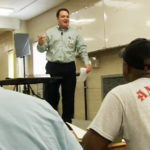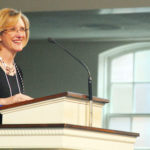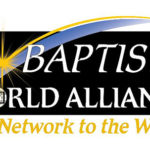Some Baptists stress evangelism, and others emphasize the social gospel. Some believe Christ died for all people; others say Christ died only for the elect whom God predestined to salvation. Historically, some defended slavery; others championed civil rights.
Even a cursory look at Baptists reveals wide diversity in beliefs and practices. But Baylor University religion professor Doug Weaver believes a common thread has run throughout Baptist history—the desire to replicate the New Testament model of the church.
“Baptist history has often been a journey in search of the New Testament church. Many Baptists assumed that the New Testament only had one type of church structure, and they embodied it. However, this restorationism, this constant quest for the pure church, produced an ever-flowing stream of different readings of the Bible. One distinctive would be emphasized by one group, and then another group would emphasize something else,” Weaver wrote in his recently published book, In Search of the New Testament Church: The Baptist Story.
|
St. Paul preaches at Thessalonika, from a Gustave Dore illustration. Baylor professor Doug Weaver believes a common thread has run throughout Baptist history—the desire to replicate the New Testament model of the church.
|
Other historians have noted the importance Baptists have placed on modeling their practices and beliefs after the New Testament church.
In Baptist Ways: A History, Bill Leonard noted, “Biblicism led many Baptists to adhere to a strenuous ‘primitivism,’ a belief that the true church in any era is the one that best replicates the New Testament church.”
William Brackney, writing in A Genetic History of Baptist Thought, said: “Among the Baptist theologians, Scripture was the starting point for a new doctrine of the church. They found the charter and practices of a New Testament form of Christianity in the Bible free from the corruption of ecclesiastic machinery.”
Baptists share with Protestants in general a commitment to Scripture, Weaver noted. But they bring alongside that commitment to biblical authority a belief in the soul competency of every person and a fierce dedication to religious freedom.
“What is essential to being Baptists? It’s the freedom to read the Scriptures and to say God can give a fresh word—not a new revelation contrary to the Bible, but a fresh understanding from the Bible,” Weaver said in an interview.
“The issue of conscience is crucial. The conscience of the individual has to be free to answer to God first and only secondarily to anyone else. … Emphasis on individual conscience, alongside the search for the New Test-ament church, is a distinctive way for us.”
Sign up for our weekly edition and get all our headlines in your inbox on Thursdays
Baptists’ emphasis on “unfettered conscience” has proved important because it “preserves or guarantees the right to dissent against conformity, whether it be from church or state,” Weaver observed.
Adherence to that principle has resulted in “messy freedom,” and most Baptists have accepted messiness as a price they have been willing to pay for liberty, Weaver added. Sometimes, that has cast Baptists in the role of troublemakers.
“Baptists have been dissenters. When we have been a dissenting minority, that has been the best of the Baptist tradition,” he said.
Baptists have held in tension the role of the individual conscience before God and the role of the faith community in practicing discipline, he added.
“Individual conscience should always be honored, but in Baptist life, the local church acts as the ‘bishop.’ It surely can exclude the lonely prophet, but the lonely prophet and dissent were allowed because no one could come between a believer and God,” Weaver said.
At their best, Baptists have honored individual conscience, biblical authority and belief in Jesus Christ as Lord, Weaver insisted.
He pointed to E.Y. Mullins, the early 20th century theologian and author of The Axioms of Religion, who insisted truly born-again believers are “impelled” to be part of the church.
Weaver expressed hope Baptists in the future will find ways to honor both the role of the individual conscience and the community of faith.
“For the unfettered conscience to remain a vital principle for Baptists, we need to remember this dynamic of the individual and the church,” he said.
“Freedom is messy,” he said. “But that has been the Baptist tradition.”














We seek to connect God’s story and God’s people around the world. To learn more about God’s story, click here.
Send comments and feedback to Eric Black, our editor. For comments to be published, please specify “letter to the editor.” Maximum length for publication is 300 words.